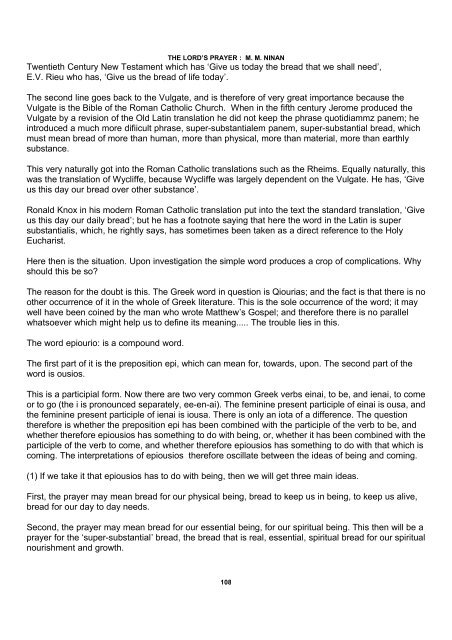Lord's Prayer
You also want an ePaper? Increase the reach of your titles
YUMPU automatically turns print PDFs into web optimized ePapers that Google loves.
THE LORD’S PRAYER : M. M. NINAN<br />
Twentieth Century New Testament which has ‘Give us today the bread that we shall need’,<br />
E.V. Rieu who has, ‘Give us the bread of life today’.<br />
The second line goes back to the Vulgate, and is therefore of very great importance because the<br />
Vulgate is the Bible of the Roman Catholic Church. When in the fifth century Jerome produced the<br />
Vulgate by a revision of the Old Latin translation he did not keep the phrase quotidiammz panem; he<br />
introduced a much more difiicult phrase, super-substantialem panem, super-substantial bread, which<br />
must mean bread of more than human, more than physical, more than material, more than earthly<br />
substance.<br />
This very naturally got into the Roman Catholic translations such as the Rheims. Equally naturally, this<br />
was the translation of Wycliffe, because Wycliffe was largely dependent on the Vulgate. He has, ‘Give<br />
us this day our bread over other substance’.<br />
Ronald Knox in his modern Roman Catholic translation put into the text the standard translation, ‘Give<br />
us this day our daily bread’; but he has a footnote saying that here the word in the Latin is super<br />
substantialis, which, he rightly says, has sometimes been taken as a direct reference to the Holy<br />
Eucharist.<br />
Here then is the situation. Upon investigation the simple word produces a crop of complications. Why<br />
should this be so?<br />
The reason for the doubt is this. The Greek word in question is Qiourias; and the fact is that there is no<br />
other occurrence of it in the whole of Greek literature. This is the sole occurrence of the word; it may<br />
well have been coined by the man who wrote Matthew’s Gospel; and therefore there is no parallel<br />
whatsoever which might help us to define its meaning..... The trouble lies in this.<br />
The word epiourio: is a compound word.<br />
The first part of it is the preposition epi, which can mean for, towards, upon. The second part of the<br />
word is ousios.<br />
This is a participial form. Now there are two very common Greek verbs einai, to be, and ienai, to come<br />
or to go (the i is pronounced separately, ee-en-ai). The feminine present participle of einai is ousa, and<br />
the feminine present participle of ienai is iousa. There is only an iota of a difference. The question<br />
therefore is whether the preposition epi has been combined with the participle of the verb to be, and<br />
whether therefore epiousios has something to do with being, or, whether it has been combined with the<br />
participle of the verb to come, and whether therefore epiousios has something to do with that which is<br />
coming. The interpretations of epiousios therefore oscillate between the ideas of being and coming.<br />
(1) If we take it that epiousios has to do with being, then we will get three main ideas.<br />
First, the prayer may mean bread for our physical being, bread to keep us in being, to keep us alive,<br />
bread for our day to day needs.<br />
Second, the prayer may mean bread for our essential being, for our spiritual being. This then will be a<br />
prayer for the ‘super-substantial’ bread, the bread that is real, essential, spiritual bread for our spiritual<br />
nourishment and growth.<br />
108


















